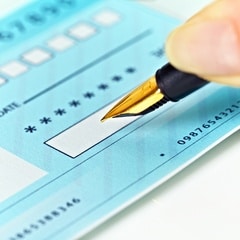Fake check scams have made victims out of 1.3 million adults, with an average loss of $3,000 to $4,000 per consumer. With billions of dollars at state, the Consumer Federation of America is launching a national campaign to combat fake checks.
According to a survey conducted for CFA, the most common fake check scams are those involving sweepstakes and lotteries (66 percent), grants (36 percent) and work-at-home opportunities (35 percent.)
Tips from the CFA to help consumers avoid fake check scams:
- Never agree to pay to claim a prize. No legitimate sweepstakes or lottery would ever send you a check or money order and ask you to send payment in return. If you really won, you would pay taxes directly to the government.
- Never agree to pay for grants from the government or foundations. They don’t offer money to people unexpectedly or charge to get it. Most grants go to organizations, not individuals, and require a lengthy and extensive application process. See new tips on grant scams at www.fakechecks.org/prevention- faqs04.html.
- Never agree to cash checks and send the money somewhere as part of a job working from home. That is not how legitimate employers operate. See new tips on mystery shopping scams at www.fakechecks.org/prevention-faqs05.html.
- Never agree to wire money to anyone you have not met in person and known for a long time.
- If it seems suspicious, get advice. Consult your state or local consumer protection agency, the Federal Trade Commission, the Postal Inspection Service, or another trusted source.
- Remember that there is no legitimate reason why anyone who wants to give you a check or money order for something would ever ask you to send money anywhere in return. Go to www.fakechecks.org to learn more about how to protect yourself from fake check scams.







Leave A Comment